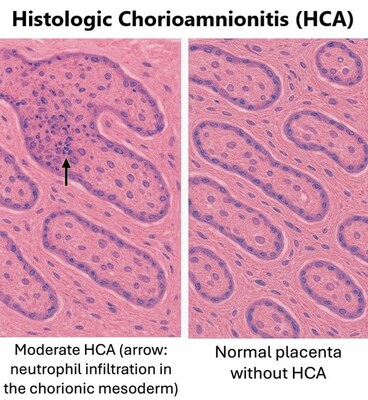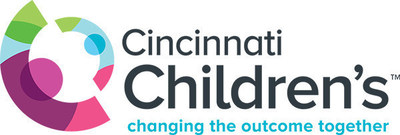Infection That Causes Many Preterm Births Also Linked to Developmental Disruptions
Large study confirms that toddlers born early after exposure to moderate to severe chorioamnionitis show signs of motor, cognitive, and language impairments
CINCINNATI, Sept. 9, 2025 /PRNewswire/ -- Moderate to severe HCA is independently associated with brain abnormalities at birth and neurodevelopmental impairments at age 2 among preterm infants, according to new research led by experts at Cincinnati Children's.
Details were published Sept. 9, 2025, in JAMA Network Open. Laura Peterson, MD, a member of the Division of Neonatology and Pulmonary Biology, was first author. Nehal Parikh, DO, MS, a neonatologist, neuroscientist, and director of the Neurodevelopmental Disorders Prevention Center within the Perinatal Institute was corresponding author.
"These findings demonstrate the adverse and enduring impact of histologic chorioamnionitis – the most common cause of very preterm birth – on both brain and neurodevelopment," Parikh says.
Co-authors say the results serve as a reminder to clinicians of the serious impacts that can occur to the developing fetus from infection-related or sterile inflammation, underscoring the importance of infection prevention practices. The study also suggests a need for more substantial counseling for parents about future neurodevelopmental impairment risk.
What is Chorioamnionitis?
This serious bacterial infection is the most common cause of maternal care teams urging preterm delivery at less than 32 weeks gestation. These infections affect the amniotic sac, amniotic fluid, and placenta; causing symptoms including fever, maternal and fetal rapid heart rate, tender uterus, and foul-smelling amniotic fluid.
Overall, chorioamnionitis occurs in 1% to 5% of pregnancies. It can be caused by multiple strains of bacteria including E. coli and Group B strep. Sometimes, antibiotics do not stop the infection, which makes this condition responsible for about 70% of "very early" preterm deliveries.
Lingering brain impact confirmed
Over the years, experts have debated the connection between chorioamnionitis and brain development, with some questioning whether preterm birth itself or other factors play bigger roles in outcomes for toddlers. This study was designed to help settle much of the debate.
This study followed 300 children participating in the Cincinnati Infant Neurodevelopment Early Prediction Study (CINEPS), an ongoing project funded by the National Institutes of Health. In addition to the large number of children studied, each infection was confirmed through lab examination of placental samples and only those who experienced moderate to severe chorionic or amnionic inflammation were included in the HCA group.
The researchers also used statistical techniques to disentangle the indirect effects of inflammation and infection on neurodevelopment via preterm birth and brain injury from direct effects on developmental problems observed later.
"We believe our study design helped overcome confounding factors that have produced mixed results in past studies of chorioamnionitis," Parikh says.
What do the findings mean for families?
Young brains have a remarkable ability to "re-wire" themselves for years after children are born. This process works best, however, when developmental challenges are detected early and addressed promptly.
"With a clarified understanding that children affected by chorioamnionitis face longer term risks, it becomes important to increase efforts to connect families to the follow-up support care their children need," Parikh says.
Next steps
Co-authors say more study is needed to understand the mechanistic details about how chorioamnionitis influences brain development. Meanwhile, Parikh's team is retesting the CINEPS cohort at school age. Researchers seek to track any ongoing brain-related impacts on learning, including the outcomes of interventions, while also exploring other potential long-term impacts affecting the lungs, heart, and nervous system.
About the study
In addition to Peterson and Parikh, Cincinnati Children's co-authors in this study included Shalini Roy, BS, Stephanie Merhar, MD, MS, and Karen Harpster, PhD, OTR/L. Viral Jain, MD, from the University of Alabama Birmingham also contributed.
Funding sources included grants from the National Institutes of Health (R01-NS094200), the National Institute of Neurological Disorders and Stroke (R01-NS096037), and the National Institute of Biomedical Imaging and Bioengineering (R01-EB029944).
![]() View original content to download multimedia:https://www.prnewswire.com/news-releases/infection-that-causes-many-preterm-births-also-linked-to-developmental-disruptions-302551101.html
View original content to download multimedia:https://www.prnewswire.com/news-releases/infection-that-causes-many-preterm-births-also-linked-to-developmental-disruptions-302551101.html
SOURCE Cincinnati Children's Hospital Medical Center



